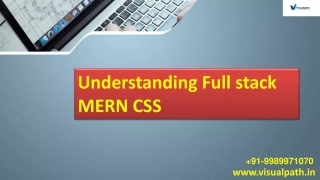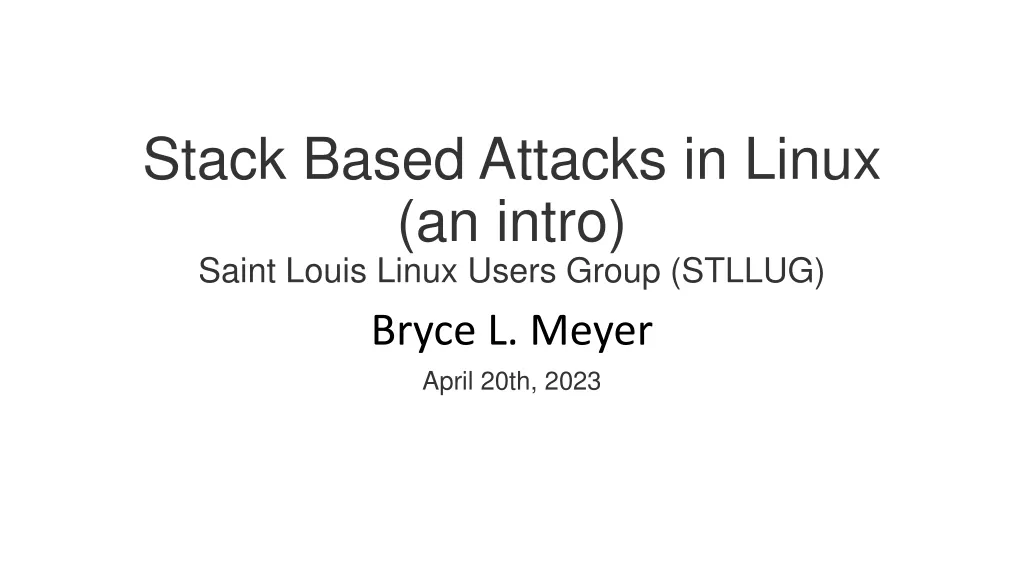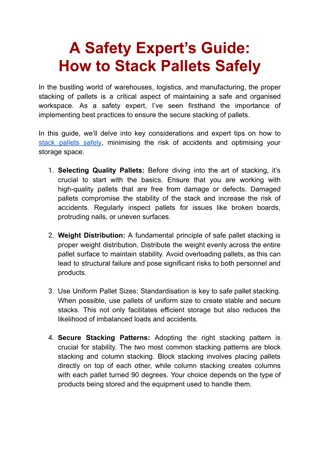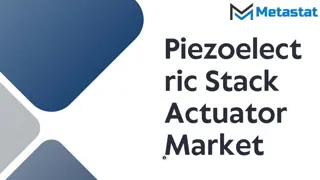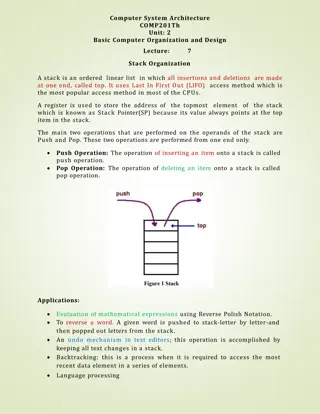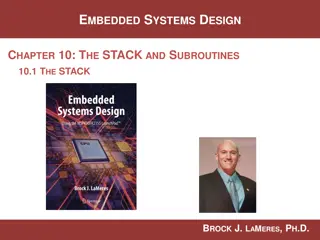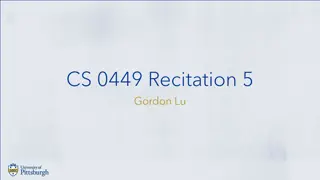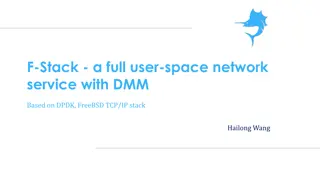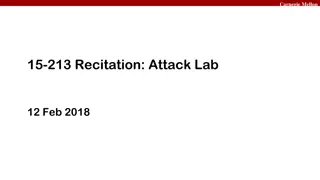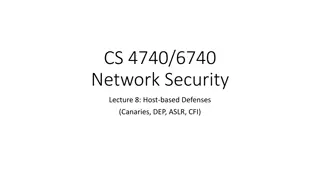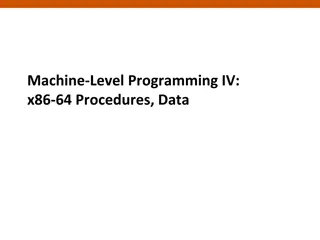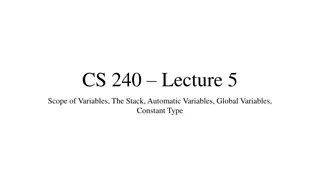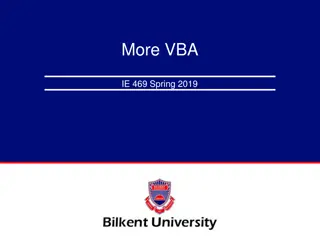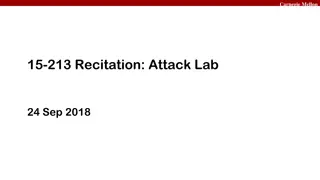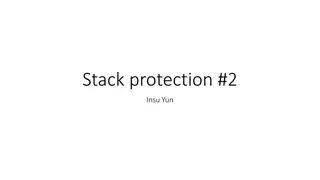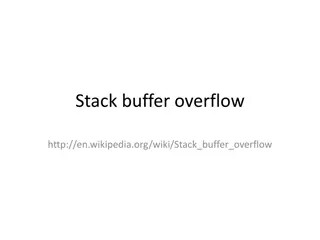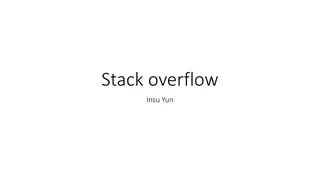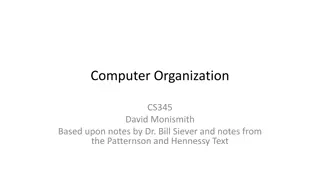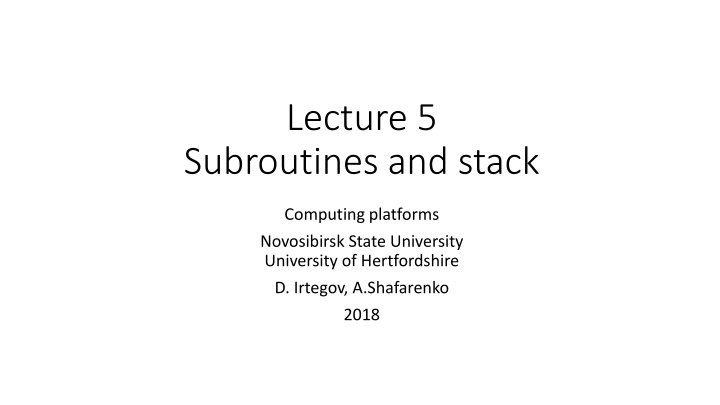
Subroutines, Stack Operation, and CPU Protection
Learn how subroutines and stack work in computing platforms, with insights on the CdM-8 CPU's stack operation, the risks of overwriting programs, and the concept of function pointers. Understand the importance of subroutine activation records in managing local variables and recursion.
Download Presentation

Please find below an Image/Link to download the presentation.
The content on the website is provided AS IS for your information and personal use only. It may not be sold, licensed, or shared on other websites without obtaining consent from the author. If you encounter any issues during the download, it is possible that the publisher has removed the file from their server.
You are allowed to download the files provided on this website for personal or commercial use, subject to the condition that they are used lawfully. All files are the property of their respective owners.
The content on the website is provided AS IS for your information and personal use only. It may not be sold, licensed, or shared on other websites without obtaining consent from the author.
E N D
Presentation Transcript
Lecture 5 Subroutines and stack Computing platforms Novosibirsk State University University of Hertfordshire D. Irtegov, A.Shafarenko 2018
Stack Stack as a primitive (opaque type with predefined set of operations) Primitive means that we have semantic of the operations But do not know (or should not rely on) details of implementation. So we can change implementation without changing the semantics Two operations: push and pop Push stores data in some [internal] storage Pop retrieves them in LIFO (Last In First Out) order
Stack on CdM-8 SP register (we discussed it during CocoIDE demonstration) Main memory pointed by SP register (*SP) Push rn ((SP-1) SP) then (rn *SP) Pop rn (*SP rn) then ((SP+1) SP) At CPU power on, SP==0 First push makes SP==255, so stack starts from the top of the RAM Be careful!
Be careful! If you push too many times, you can overwrite your program! If you pop more times than push, SP wraps over to 0 and you can overwrite your program again! Commercial CPU (x86, ARM) have hardware protection against this We will discuss it in Operating System course And this protection is not 100% bulletproof (you can mess your stack if you really want to) CdM-8, like most other 8-bit CPU, has no hardware protection (at least in basic configuration)
Wait, there is more! Ldsa rn, offset SP+offset rn Not in instruction-set.pdf (we re working on this) Addsp n SP=SP+n Ldsp rn, Stsp rn Move SP to/from a GP register n
Subroutine call and return Jsr [const] SP-1 SP, then PC *SP, then const PC In most modern CPUs this instruction is called Call Jsr mnemonic comes from IBM 360 Rts *SP *PC, then SP+1 SP Jsrr rn SP-1 SP, then PC *SP, then rn PC You can implement function pointers!
Subroutine activation record Create a space for local variables New space for every new call Allows recursion CdM-8 has no frame pointer Caller push param to stack Then jsr to callee Then callee addsp frame size And uses ldsa to access values
Special syntax for local variables (and structs!) 1 tplate foo 2 dc "abcde" 3 a: ds 13 4 dc "this is it" 5 b: ds 7 6 7 asect 0 8: main: 00: 05: 12: 1c: 23: 00: c9 05 9 ldsa 02: ca 1c 04: cb 23 . r1,foo.a r2,foo.b r3,foo._ 10 ldsa 11 ldsa
What exactly tplate directive does? A template is a named absolute section that starts at 0, does not allocate any memory dc parameters are only placeholders is accessible in the whole source file, the section s text can not be interrupted and continued later Each label defined within a template is absolute and must be referenced using the prefix name.
Calling conventions How to pass parameters On registers? Fast, but CdM-8 has too few registers Cannot pass structures On stack? Relatively slow Who cleans the stack after the call? On CdM-8 it is hard for callee to clean the stack, but other CPU have means for that Callee must know size of parameters to clean the stack (impossible in C) How to save registers? Clean protocol (callee must save all registers before touching them) Dirty protocol (callee can change any register) Hybrid protocol (some registers must be saved, some are not)


